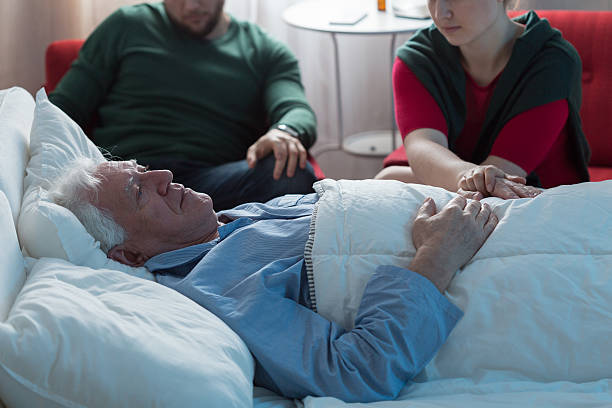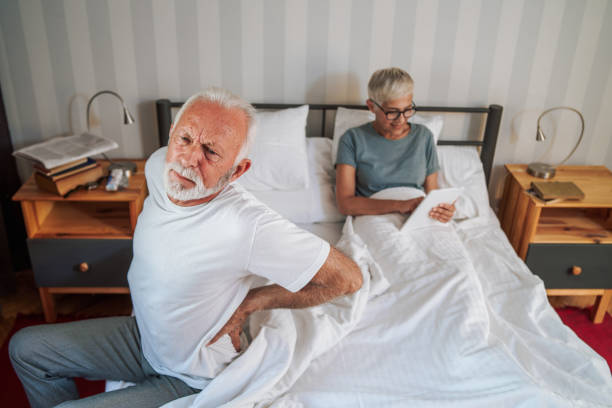Introduction

A good night's sleep is crucial for everyone's well-being, but for individuals living with Parkinson's disease, it becomes even more essential. Parkinson's can affect various aspects of sleep, such as restlessness, muscle stiffness, and difficulty changing positions. However, with the right bedding choices, it is possible to create a sleep sanctuary tailored to the specific needs of Parkinson's patients.
From selecting the right mattress to choosing appropriate pillows and bedding accessories, this blog post will guide you through transforming your bedroom into a Parkinson's-friendly haven where rest, comfort, and sleep quality are prioritized. By implementing these tips and recommendations, you can significantly enhance your sleep experience and promote overall well-being despite the challenges posed by Parkinson's.
What is Parkinson's disease?
Parkinson's disease is a progressive degenerative neurological disorder that affects movement, balance, and coordination. The exact causes of the disorder are unknown, but it is believed to be caused by an imbalance of certain chemicals in the brain. Symptoms can range from tremors to difficulty with moving or speaking, impaired posture and gait, and insomnia.
What is a Parkinson's-friendly sleep sanctuary?

Creating a "sleep sanctuary" tailored to the needs of people living with Parkinson's Disease (PD) is essential for providing comfort and relaxation. A sleep sanctuary should be designed to optimize safety, support mobility issues, and provide the necessary items to enhance sleep quality.
How to Create a Parkinson's-Friendly Sleep Sanctuary with the Right Bedding
For individuals living with Parkinson's disease, a good night's sleep is crucial for maintaining overall well-being. Creating a sleep sanctuary that accommodates the specific needs and challenges associated with Parkinson's can significantly enhance sleep quality.
Here are some tips to help you create a Parkinson's-friendly sleep sanctuary:
Opt for a Firm and Supportive Mattress:
Choosing the right mattress is essential for individuals with Parkinson's. A firm mattress provides better support, allowing for proper spinal alignment and minimizing discomfort. Consider a mattress with memory foam or latex, as they contour to the body, alleviating pressure points and ensuring a comfortable sleep surface.
Invest in Adjustable Bed Frames:
An adjustable bed frame can benefit people with Parkinson's as it allows for customized positioning. This feature enables individuals to find the most comfortable angle for sleeping, providing relief from muscle stiffness, pain, and difficulty in mobility. Adjustability can also aid in getting in and out of bed more easily.
Prioritize Bed Height and Safety:
Adjusting the bed height is crucial for individuals with Parkinson's, as it can assist in minimizing falls and enhancing overall safety. The ideal bed height allows easy entry and exit without straining the muscles. Consider using bed risers or choosing a bed frame with adjustable height options to accommodate individual needs.
Select Bedding Materials Wisely:
Choosing the right bedding materials can enhance comfort and promote better sleep. Opt for soft, breathable, and hypoallergenic fabrics that are gentle on the skin and prevent overheating. Performance fabrics that help to keep a warm body dry from perspiration are excellent choices as they promote temperature regulation and feature moisture-wicking properties, helping to keep you cool and dry throughout the night.
Use Bedding Accessories:
Additional bedding accessories can further enhance comfort and sleep quality. Consider using a body pillow to provide extra support for different parts of the body, such as the neck, back, and legs. This can help reduce muscle tension and alleviate discomfort associated with Parkinson's. A weighted blanket may also benefit some individuals, as it can provide a calming effect and aid in reducing restlessness.
Ensure Safety and Accessibility:
Incorporate safety measures into your sleep sanctuary. Install proper lighting near the bed, making it easier to navigate during the night. Use non-slip mats or rugs to prevent slips and falls. To promote independence and convenience, keep essential items within reach, such as medications, water, and a phone.
How can the right bedding contribute to a Parkinson's-friendly sleep environment?
The right bedding can contribute significantly to a Parkinson's-friendly sleep environment. For Parkinson's patients, the mattress should provide adequate support for the body while allowing easy movement as they move around during sleep. A good quality mattress constructed from breathable materials will help reduce pressure points. Friction-reduced sheets and sleepwear minimize tossing and turning so the patient can rest peacefully thereby promoting a more restful sleep.
In addition to the mattress, choosing the right bedding is equally important. Soft, lightweight breatheable materials will help keep the body cool while providing a comfortable sleep experience. A supportive pillow is also recommended, as it can help promote proper head and neck alignment. Additional blankets and sheets should be used in the winter to help keep the body warm.
Finally, it is important to create a calming environment for Parkinson's patients as they head off to sleep. This can include dim lighting, soothing music, and aromatherapy diffusers with essential oils. These strategies will help promote peaceful and restful sleep for Parkinson's patients.
By creating a Parkinson's-friendly sleep environment with the right bedding and accessories, people with Parkinson’s will have improved ability to get quality rest during the night. This will help to provide more energy during the day and improve overall quality of life.
Are there specific features in bedding that can help alleviate common sleep disturbances associated with Parkinson's?
Yes! Several types of bedding can help alleviate common sleep disturbances associated with Parkinson's. For example, a mattress topper or pillow designed specifically for people with PD can provide extra support and comfort while sleeping.
Additionally, temperature-regulating bedding like cooling pillows, moisture-wicking sleepwear, weighted blankets, and adjustable beds may all help with night sweats and restlessness and provide a comfortable temperature for sleeping. Lastly, using blackout curtains or blinds can help reduce light exposure and create a darker environment conducive to quality sleep.
Overall, having the right bedding items can make a huge difference in creating an environment more conducive to quality rest. Finding the items that work best for you and your needs is important. With a few simple changes, it is possible to get the kind of sleep necessary to help manage Parkinson's symptoms.
If you have any questions or need additional help, please get in touch with us today! We are here to help advise on the best bedding items for your needs.
What types of bedding should be avoided for someone with Parkinson's?

For people with Parkinson's, it is important to choose bedding and sleepwear that do not cause additional pain or discomfort. If you have any specific medical needs, it is always best to consult your doctor before purchasing a new mattress or bedding set. Generally, firm mattresses are considered best for people with Parkinson's, as they provide a supportive and comfortable sleeping surface. Thick mattress toppers can also make the bedding softer and easier on the body.
In addition, it is important to avoid overly soft mattresses that allow your body to sink in too deeply. These types of mattresses can put a strain on the spine and lead to excessive stiffness. The same is true for bedding such as feather or down pillows, which may cause an increase in muscle aches and pains common with Parkinson's. Pillows should be chosen for proper head and neck support, and it is best to avoid those made from synthetic materials.
Choosing bedding and sleepwear that help keep your body temperature regulated is also important. Fabrics that are breathable and have moisture-wicking features can help reduce discomfort from night sweats, a common problem for people with Parkinson's. Additionally, it is important to consider the weight of the bedding when selecting blankets and comforters. Heavier materials may be too cumbersome for someone with limited mobility, while lighter fabrics offer better comfort and temperature regulation. However, note that the use of friction-reducing sheets and sleepwear is a helpful strategy to enable the benefits of weighted blankets but without their possible negative impact on ease of turning.
Finally, choosing bedding that can be easily washed and maintained to keep it clean is important. Allergens and dust mites may cause further discomfort or respiratory issues in someone with Parkinson's, so good hygiene is essential. Choosing bedding that can be easily removed, washed, and replaced helps to ensure a healthy sleeping environment.
FAQ's
What is the best bedding for Parkinson's patients?
The best bedding for Parkinson's patients will depend on individual needs and comfort levels. Generally, firmer mattresses are considered best as they provide a supportive and comfortable sleeping surface. Thick mattress toppers can also make the bedding softer and easier on the body.
How do you get a good night's sleep with Parkinson's?
Getting a good night's sleep with Parkinson's can be challenging, but there are several things you can do to promote better rest. Finding the right bedding items that work best for your needs is important. This may include using a mattress topper or pillow designed specifically for people with PD, temperature-regulating and moisture-wicking bedding and sleepwear, cooling pillows, weighted blankets, and adjustable beds.
What is a sleep aid for Parkinson's disease?
A sleep aid for Parkinson's disease may include medications, supplements, or lifestyle changes. Medications like melatonin and benzodiazepines can be prescribed to help induce and maintain sleep. Supplements such as magnesium or omega-3 fatty acids can promote better sleep habits. Finally, make small adjustments to your routine, such as limiting caffeine intake, going to bed and waking up at the same time each day, avoiding foods that may cause indigestion or discomfort before bed, and creating a dark and comfortable sleep environment with the right bedding can all help improve sleep quality.
Why can't people with Parkinson's sleep at night?
People with Parkinson's may struggle to sleep due to various factors, such as joint pain or stiffness, muscle cramps or spasms, night sweats, difficulty getting comfortable in bed, and restlessness. Additionally, medications used to treat PD can interfere with sleep and cause difficulty falling or staying asleep throughout the night. It is important to find the right bedding items that work best for your individual needs and make changes to lifestyle and diet that promote better sleep.
What foods are high in dopamine for Parkinson's disease?
Foods high in dopamine for Parkinson's disease include meat, fish, eggs, legumes, nuts, and seeds. Additionally, dark leafy greens like spinach and kale are rich sources of L-dopa, a precursor to dopamine that helps replenish levels in the body. Other healthy foods, such as fruits and vegetables, can also help as they contain important antioxidants and nutrients that support brain health. Finally, avoiding processed foods with artificial ingredients and added sugars is also beneficial for overall health.
How do you make someone with Parkinson's more comfortable?
Making someone with Parkinson's more comfortable can depend on individual needs, but several things may help. Providing a safe and supportive environment is important, as this can reduce stress levels and make it easier for them to relax. Friction-reducing sheets and sleepwear are proving very effective in facilitating movement and taking the struggle out of getting in and out and turning in bed.
Conclusion
I hope that this article has helped provide insight into how to create a Parkinson's-friendly sleep sanctuary with the right bedding. If you have any questions or need assistance, please contact us.
Creating the proper environment and choosing the right bedding for someone with Parkinson's can help promote better rest and overall comfort. Firm mattresses with a soft top layer are often recommended, providing a supportive and comfortable sleeping surface.
Additionally, it is important to choose bedding materials that are temperature-regulating and easy to maintain for proper hygiene. Finally, making small changes to lifestyle habits, such as limiting caffeine intake or avoiding foods that cause indigestion, can also help improve sleep quality. Please consult your doctor before purchasing a new mattress or bedding item to ensure it is the right choice. For additional advice, please feel free to contact an expert. With the right bedding and lifestyle changes, you can create a Parkinson's-friendly sleep sanctuary that promotes better rest and overall comfort.

